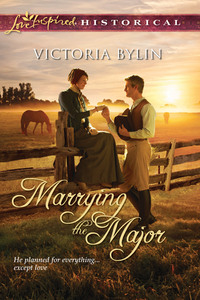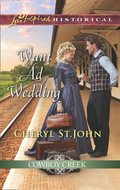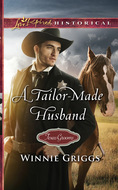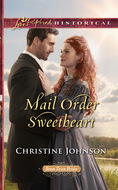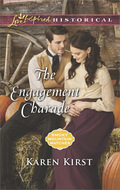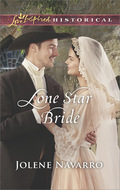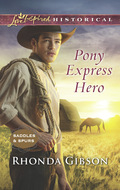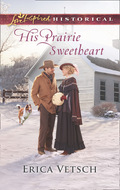Das Buch kann nicht als Datei heruntergeladen werden, kann aber in unserer App oder online auf der Website gelesen werden.
Buch lesen: "Marrying The Major"

“For years I’ve dreamed of having a family, but no man wanted me.”
Now Tristan knew Caroline’s motives. They were pure and painfully simple. She wanted to be a mother.
She paced up to him with her eyes blazing. “I’d do anything—even marry you—for the sake of two beautiful children. Does that confession satisfy you, Major Smith?”
A wry smile lifted his lips. “You’re a brave woman, Caroline.”
“I’m not brave at all,” she murmured.
“I think you are,” he answered. “I’d be pleased to marry you … for the sake of the children, of course.”
The moment called for a handshake. They were sealing a business deal. But Tristan couldn’t bring himself to offer merely his hand. Neither could he kiss her, not even as a token of friendship. Moving slowly, he touched her cheek. “You should call me Tristan.”
Dear Reader,
Writers are always looking for fresh ideas. Maybe that’s why I matched Caroline Bradley, the last of the Swan’s Nest heroines, with a retired British Army officer. To make the romance more challenging, I gave him malaria. Somewhere along the line, my hero surprised me yet again by announcing he was the third son of a duke and that he’d become heir apparent.
Tristan’s disclosure led to more questions than I ever imagined. How are titles passed on? What are the proper forms of address? What’s the difference between a duke, a marquis, a marquess and an earl? Then there are the titles for women and how they’re used … And that’s just the beginning.
The rites of inheritance were crucial to this book, and I started off with the mistaken notion that a man could refuse an inherited title. I owe a debt of gratitude to the online community of romance writers who graciously offered help with the facts and led me to websites with oodles of information.
This Western writer did her best, but a Stetson fits me better than a tiara. Any mistakes are mine.
With Caroline happily married, the WOMEN OF SWAN’S NEST series has come to an end. I’ve enjoyed telling these stories and hope you’ve laughed and cried along with the characters. In my imagination I see them all in twenty years. The women will still be friends, and they’ll be cheering for each other. The men will be working to support their families, and they’ll be loving their wives, children and grandchildren for years to come. After all, a good love story never really ends.
All the best,

About the Author
VICTORIA BYLIN fell in love with God and her husband at the same time. It started with a ride on a big red motorcycle and a date to see a Star Trek movie. A recent graduate of UC Berkeley, Victoria had been seeking that elusive “something more” when Michael rode into her life. Neither knew it, but they were both reading the Bible.
Five months later they got married and the blessings began. They have two sons and have lived in California and Virginia. Michael’s career allowed Victoria to be both a stay-at-home mom and a writer. She’s living a dream that started when she read her first book and thought, “I want to tell stories.” For that gift, she will be forever grateful.
Feel free to drop Victoria an email at
VictoriaBylin@aol.com or visit her website at
www.victoriabylin.com.
Marrying the Major
Victoria Bylin

MILLS & BOON
Before you start reading, why not sign up?
Thank you for downloading this Mills & Boon book. If you want to hear about exclusive discounts, special offers and competitions, sign up to our email newsletter today!
Or simply visit
Mills & Boon emails are completely free to receive and you can unsubscribe at any time via the link in any email we send you.
This book is dedicated to my sons,
Joseph Scheibel and David Scheibel.
One’s traveled the world and the other is a soldier.
They both influenced this story. Love to you both!
Which of you, if your son asks for bread,
will give him a stone? Or if he asks for a fish, will
give him a snake? If you, then, though you are evil,
know how to give good gifts to your children,
how much more will your Father in heaven
give good gifts to those who ask him!
—Matthew 7:9–11
Chapter One
Wheeler Springs, Wyoming, October 1876
Tristan Willoughby Smith didn’t like to be kept waiting, and he’d been waiting for three days for the arrival of the quinine he needed to treat his malaria. He’d also been waiting for the arrival of the Bradley sisters. He’d hired the youngest, Miss Caroline Bradley, to be the governess to his children. He’d hired the elder sister, Miss Elizabeth Bradley, to serve as a nurse and advisor for the treatment of the disease he’d contracted in the West Indies.
Tristan had a high tolerance for the fevers that came with malaria, but he had no patience at all with tardiness. A former major in the British army, he expected people to do what he told them.
He expected such obedience from his children.
He expected it from the men who worked his cattle ranch.
Mostly he expected such discipline from himself.
He also expected discipline from the stage line scheduled to deliver the quinine he needed to control his fevers. With his hands on his hips, he stared down the windblown street that made up the heart of Wheeler Springs. The stage was three days late. He’d contracted the disease four months ago. The year before it had taken his wife, Molly, leaving him alone to care for their two children. To protect them from the disease, Tristan had come to Wyoming with Jonathan Tate, his best friend and former second in command. Wyoming was as far from malaria—and his home in England—as Tristan could get. It was also eighteen hundred miles away from the Philadelphia pharmaceutical company that manufactured the quinine. If the quinine was lost, he’d be in dire straits.
As much as Tristan needed the medicine, he needed Caroline Bradley even more. The new governess didn’t know it, but he had plans for her that went beyond tutoring his children. He had plans for Jon, too. If malaria put Tristan in an early grave, his best friend would be the executor of his will and guardian of his children. Under no circumstance did Tristan want his children returned to his family in England. As the third son of a nobleman, Tristan had no importance. That fact had been drilled into him by his father, Harold Smythe, the Duke of Willoughby, and he didn’t want Freddie and Dora growing up under the same cloud.
He also wanted them to have a mother, especially if the malaria took his life. Whether Tristan lived or died was up to God, a being he viewed as a Supreme Commander who gave orders without discussion. Tristan would submit to God’s decree, but he couldn’t bear the thought of leaving Freddie and Dora without a family. That’s where the new governess came in. It was high time Jon settled down. If Tristan died, he expected Jon to marry her and give the children a mother. He’d ruled out the oldest sister for this particular job. The Bradley sister, named Elizabeth, was twelve years older than the younger one, and in her letters she’d stated her dedication to nursing. The governess, however, had written eloquently about her love of children.
The wind kicked a tumbleweed across the street. For the first day of October, the air held a surprising chill. Or had the chill come from within, the first sign of yet another attack of illness? Tristan glanced up at the sky. The fevers usually started late in the day, and the sun had yet to reach its peak. Still, the chill was enough to show him that he couldn’t wait any longer to find out what had happened to the stage. A military man, he sized up the obstacles between the railhead in Cheyenne and Wheeler Springs.
The Carver gang could have held up the stage.
Indians could have attacked.
An afternoon storm could have washed out the road and taken the stagecoach with it.
Tristan had a fertile imagination—a blessing to a poet but a curse for an army officer and a bigger curse for a man with malaria.
The door to the stage office swung open and Jon strode forward. He was forty-two, seven years older than Tristan, but he hadn’t lost an ounce of the muscle that made him a formidable captain in the West India Regiment. Neither had he lost the dour expression he wore around everyone except Tristan’s children. Five-year-old Dora had Uncle Jon wrapped around her little finger, and Freddie, almost ten, lived in the man’s shadow.
Jon had gone to speak with Heinrich Meyer, the owner of the inn that served as the stagecoach stop. Looking at his friend, Tristan felt a familiar dread. “It’s bad news, isn’t it?”
“Yes, sir.”
In private, Jon had stopped calling Tristan “sir” five years ago. The formality signaled trouble. In a habit from his days in uniform, Tristan laced his hands behind his back. “Go on.”
“The bridge over the gorge is out.”
Tristan blanked his expression, but his belly clenched. Two days ago a storm had ripped through Wheeler Springs. Runoff from the hills would turn the Frazier River into a torrent. The first time he’d ridden over the bridge that spanned the gorge, he’d called it a rickety abomination. Without the bridge, the stagecoach would have to take a longer route from Cheyenne or return to the city to await repairs. Even more worrisome, the coach could have been washed into the gorge. He imagined it lying on its side in the river, the quinine crystals saturated and useless. He thought of the governess and her sister injured or dead.
“We need to find the coach,” he said to Jon.
“And quickly.” His friend lowered his voice. “The Carver gang is in the area.”
The Carvers had advanced from rustling cattle to robbing banks and stagecoaches. They were tough, crass and mean. The thought of the governess and her sister being trapped between Wheeler Springs and Cheyenne and at the gang’s mercy made Tristan’s neck hairs prickle.
“Get the horses, will you?” He’d have preferred to take a wagon to carry the women and their belongings, but the downed bridge made it necessary to go on horseback.
Jon gave him a quelling look. “You’re not well. I’ll go with Heinrich and his son.”
“I’m fine.”
“No, you’re not.”
“I am,” Tristan said evenly. “I have to be. I’m almost out of quinine and you know it.”
“And if you get feverish?” Jon knew how to be honest but respectful. “You’ll be more of a burden than a help. Stay here, Tristan.”
“Absolutely not.”
“But—”
“Don’t argue with me.” Tristan hadn’t lived his life sitting on the sidelines, and he didn’t intend to start now. He’d felt worse and done more. “Not only do I need the quinine, but the new governess and her sister are possibly stranded between here and Cheyenne. They’re my responsibility. I’m going and that’s final.”
“If you say so, sir.”
Jon emphasized sir not as a sign of respect but as a way of telling Tristan he was being a fool. If Tristan became ill, Jon would be stuck with him. An obvious solution loomed. He’d simply refuse to fall ill. He glanced at the sky. If they rode hard, they’d reach the river before dusk. “Get supplies. We’ll leave immediately.”
“I figured you’d be stubborn.” Jon looked peeved. “Heinrich sent his son to ready the horses.”
Shoulder to shoulder, the men paced to the mercantile. While Jon ordered supplies from the storekeeper’s wife, Tristan weighed the facts. The ride to Cheyenne took two full days, three if the weather muddied the roads. A stagecoach station sat between the city and the town. He and Jon could be gone a week, maybe longer.
He had to get word to Bert Howe, the ranch foreman, and Evaline, his housekeeper and the woman tending to Freddie and Dora. Tristan had no worries about the ranch, but he worried greatly about his children. They tended to be nervous about his whereabouts. He had to get word to them that he’d be gone longer than expected. He kept a house in Wheeler Springs, and he knew just the man to deliver the message. Noah Taylor was Tristan’s houseman, Evaline’s husband and a former sergeant in the West India Regiment.
“I need to speak with Noah,” Tristan said to Jon. “Someone has to let Bert and Evaline know what’s happened.”
Jon nodded and went back to purchasing supplies. Tristan crossed the street at a rapid pace, glancing up at the sun and wondering again about the sheen of sweat on his brow. He hated being ill. It turned him into the skinny boy who’d grown up on his father’s massive estate.
England had stopped being home the day he’d walked out of his father’s study. As a third son, he’d known early that he had limited prospects. He just hadn’t expected his father to be so blunt about it … or so cruel.
You have no place here, Tristan. Join the army. Become a clergyman. I don’t care what you do.
That parting had been fifteen years ago. Tristan had never been interested in religion. In boarding school he’d been taught to believe in God as a father. If the Almighty was anything like the duke, Tristan wanted nothing to do with him. He accepted God’s power, submitted to His authority, but felt no love for Him. Instead of joining the church, he’d used a portion of a large inheritance from an uncle to purchase a commission in the British Army. To make the break from his father complete, he’d changed the spelling of his name from the aristocratic “Smythe” to the more egalitarian “Smith.” Tristan missed England, but he’d never go back to his father’s estate. If the malaria claimed him as he feared, he wanted to buried at the ranch he called “The Barracks.”
Of course he didn’t want to be buried at all. He wanted to see Freddie become a man and Dora a wife and mother. Given a choice, he’d die an old man with a soft belly and a head full of gray hair.
But he didn’t have a choice. God controlled his fate the way a commander waged a war. Tristan could only lead the battles in his control, which meant ensuring his children wouldn’t be returned to England. It wasn’t likely the duke would have an interest in Freddie, and it was certain he’d consider Dora a worthless girl, but Tristan had still made legal arrangements to name Jon as guardian. Silently he gave thanks he hadn’t been born first. His oldest brother, Andrew, was heir apparent. He’d married Louisa Hudgins, the woman Tristan himself had hoped to wed. She and Andrew had probably produced a dozen children by now. Tristan’s second brother, Oscar, would have married as well, though he’d been legendary for his romantic capering.
Putting his thoughts aside, Tristan strode to his town house. Stepping through the front door, he called to Noah. The man stepped immediately into the foyer. Tall and black, he carried himself with the military bearing he’d earned in the West India Regiment. The WIR was composed of free blacks and led by white officers from En gland. Most of the officers considered the post undesirable, at best a stepping-stone to another assignment. Tristan had felt otherwise. In his own way, he knew how it felt to be judged inferior. He’d led his men with pride and they’d fought with courage. When Tristan made the decision to settle in Wyoming, he’d invited Noah to work for him.
“Good morning, sir.” Noah spoke with the singsong tones of the Caribbean. “Any word on the stagecoach?”
“The bridge is out. Jon and I are going to look for the passengers.” He didn’t mention the quinine. Needing medicine stung his pride, and Noah already knew the importance of it.
The former sergeant gave him the same look he’d gotten from Jon. “If you’ll excuse me, sir. Is that wise? You’re not well, and—”
“I’m well enough.” Tristan hated being questioned, a fact Noah knew better than most men. That he’d dared to bring up Tristan’s health showed both respect and caring.
Tristan took the command out of his voice. “I need you to get word to The Barracks. The children will be worried.”
“I’ll see to it.”
“Thank you, Noah.” Tristan turned back to the door.
“Sir?”
“Yes?”
“Mrs. Harvey just delivered a letter.” She was the postmistress and very conscientious. “It arrived with last week’s stage. She apologized for misplacing it. I put it in the study.”
“Who is it from?”
“Pennwright, sir.”
Pennwright was his father’s long-time secretary, a man who joked that his name had doomed him to his occupation. When Tristan had been sent to boarding school, Pennwright had written regularly. The correspondence had started at the duke’s direction, but it had continued for years out of affection.
“I’ll look forward to it when I return,” he said to Noah.
“Yes, sir.”
Satisfied, Tristan walked to the livery where he found Jon waiting with their mounts and two packhorses. If they found the women, the females would have to ride to Wheeler Springs. As for their possessions, they’d take what the horses could carry. When the bridge was repaired, he’d send a wagon for the rest. He welcomed the thought of having such a problem. The alternative—that they’d find the coach destroyed and the driver and women dead—couldn’t be tolerated.
Looking grave, Jon handed him the reins to his favorite horse. Tristan preferred a spirited mount and the stallion he’d named Cairo had speed and intelligence. A sleek Arabian, Cairo was black with a matching mane and tail. The stallion obeyed Tristan, but he did it with an air of superiority.
Jon rode up next to him on the gray mare he favored. She wasn’t old, but Tristan had named her Grandma because she rode like a rocking chair.
As he turned Cairo down the street, the sun hit him in the face. He swiped at beads of perspiration with his sleeve, then nudged Cairo into an easy canter. With the fever lurking in his body and the Bradley sisters in places unknown, there was no time to waste. Jon rode next to him, letting Tristan set the pace.
Three hours passed with no sign of the stage. The sun peaked and was halfway to the horizon when they arrived at the downed bridge. Tristan slid wearily off Cairo, shielded his eyes from the sun and scanned the gorge for the downed stagecoach. He saw only boards from the bridge wedged between rocks and the sparkling water racing past them.
Relief washed over him. “They didn’t get this far.”
“So it seems.”
“We need to push on.” Tristan inspected the sides of the gorge. A trail led to the river and stopped at a sandy bank. The men climbed back on their horses and headed for the crossing with Tristan in the lead. The storm had turned the path into slick mud, but they arrived at the river’s edge without mishap. Cairo didn’t hesitate to wade into the current, but Grandma needed coaxing. When Tristan reached the far bank, he turned and saw his friend urging the skittish horse to take one step at a time. He hoped the river would recede before they had to cross it again, hopefully with the stage driver and the two women. When Grandma found firm footing, she bolted out of the water.
Jon grinned at Tristan. “The old girl did it.”
“Barely,” Tristan acknowledged. “For a minute, I thought you’d have to carry her.”
Jon smiled at the joke, then looked down the road. Tristan followed his gaze with the same questions in mind. Had the stage come this far and turned back? Had it gone off the road before reaching the bridge? He also had to consider the Carver gang. Fighting fever, Tristan acknowledged the cold facts. Anything could have happened. The quinine could already be lost, and the women could be hurt or trapped or worse.
With no time to waste, he barked an order at Jon. “We still have daylight. Let’s go.”
He nudged Cairo into a comfortable trot. Jon stayed with him, but at dusk Tristan admitted defeat. They hadn’t seen a single sign of the coach. With the fever nipping at him, he gave in to Jon’s suggestion that they strike camp for the night. They’d start looking again in the morning.
Caroline Bradley awoke on the hard ground with a jolt. Dawn had broken with startling splendor, but it wasn’t the golden light that roused her from a troubled sleep. It was the snap of a twig, then the frustrated muttering of a male voice. She clutched the shotgun she’d found in the boot of the stagecoach. She’d slept with it for two nights, and she knew how to pull the trigger. If the Carver gang had come back, she’d use it.
Three days ago she and Bessie had left Cheyenne for Wheeler Springs. They’d had the coach to themselves, so they’d passed the hours speculating about Tristan Willoughby Smith, his children and what life would be like on a cattle ranch. Not once had they imagined the stagecoach being robbed by the Carver gang. Thanks to the sacrifice of the driver, they’d escaped while he’d challenged the outlaws with his pistol. She and Bessie had run for their lives and hidden in a ravine, listening as the Carvers killed the driver and ransacked their trunks and other shipments. When the outlaws finished, they’d stolen the horses and pushed the yellow coach into the ravine.
Cracked and lying on its side, the old Concord had offered adequate shelter from the sun, very little from the rain and none from the frightful howling of wolves.
In the scramble down the hill, Bessie had sprained her ankle. By herself, Caroline had piled rocks on the dead driver, then she’d salvaged what she could of their possessions. In the course of her efforts, she’d found a crate addressed to Major Smith from the Farr, Powers and Weightman Chemical Laboratory in Philadelphia. It had been opened and the contents had been dumped without care. In the pile of broken bottles, she’d seen a label marked “Sulphate of Quinine.” Knowing the value of the medicine, she’d salvaged seven of the twelve bottles. They were wrapped in an old nightgown and hidden in the stagecoach for safekeeping.
She knew the major was ill, and she’d assumed he had a chronic illness or a war injury. Now she wondered if he was suffering from malaria. It had been a scourge during the war that had destroyed the South. Bessie had served as a nurse during the conflict, and she’d complained often that illness killed more men than mini balls. Major Smith, it seemed, was a very ill man. Seeing the medicine, Caroline had thought of his motherless children. Who would love them if they lost their father? Malaria was a fickle disease. It could take a man’s life in a day or linger in his blood for years.
Outlaws had the same penchant for randomness. Aware of the slow, measured steps coming toward her, Caroline weighed her options. Bessie’s ankle meant they couldn’t run. Neither could they hide. Huddling against the undercarriage of the coach, she whispered into her sister’s ear. “Bessie, wake up but don’t move.”
Her sister’s eyelids fluttered open.
The footsteps were closer now. A bird took flight from a cottonwood. Caroline wanted to fly away, too. Instead she clutched the shotgun. The steps came closer. She heard the slide of dirt and rock as he reached the bottom of the hill, then the thump of leather on dirt as he paced toward the coach. A squirrel leapt from one branch to another, springing high and then landing with a bounce. Leaves fell like dry rain. With each step the stranger came closer to the coach until all noise stopped. Caroline took a breath and held it. Nothing stirred. Not a bird. Not a breeze. Bessie lay still, watching with wide eyes and signaling her with a nod to be brave.
Leaping to her feet, Caroline aimed the shotgun at the man’s chest. “Who are you?”
He looked at her as if she were no more dangerous than a gnat. Refusing to blink, she stared down the barrel at a man who looked more like a scarecrow than an outlaw. Tall and gaunt, he had hair the color of straw and eyes so red-rimmed they seemed more gray than blue. His clothes hung on his broad shoulders, but there was no mistaking the fine tailoring. She took in the creases around his mouth, his stubbled jaw and finally the boots that reached to his knees. Black and spit-shined, they didn’t belong to a shiftless outlaw.
She couldn’t say the same for the pistol in his hand. It was loose and pointed downward, but she felt the threat. She dug the shotgun into her shoulder. “Throw down your gun!”
He raised one eyebrow. “I’d prefer to holster it, if you don’t mind.”
That voice … it reminded her of a fog bell coming out of a mist, a warning she remembered from the Carolina shore, the place of her birth and the reason for her name. She heard the trace of an accent she couldn’t identify, not the boisterous timbre of an Englishman or a German, but the muted tones of a man who’d worked to leave the past behind.
When she didn’t speak, he holstered the gun then looked at her with his hands slightly away from his body, taking in her appearance with a flick of his eyes. Caroline knew what he’d see … A woman with an average face and an average figure, past her prime but young enough to want a husband. For a few months she’d once been secretly married, but he’d see a spinster. A woman desperate enough for a family that she’d decided to become a governess. If she couldn’t have children of her own, she’d borrow them.
First, though, she had to get rid of this unknown man studying her with both fascination and fury.
“Get your hands up!” she ordered.
He kept them loose at his sides. “Perhaps—”
“Raise them!”
He let out a sigh worthy of a frustrated king. “If you insist.”
Slowly he raised his arms, holding her gaze with a force that nearly made her cower. When his hands were shoulder-high, palm out so she that she could see the aristocratic length of his fingers, he lowered his chin. “Perhaps, Miss Bradley, you’d allow me to introduce myself?”
The accent was no longer muffled. Thick and English, it held a command that made her lower the shotgun. She didn’t need to hear Tristan Willoughby Smith say his name to know she’d just met her future employer, and that she’d impressed him … in all the wrong ways.
Die kostenlose Leseprobe ist beendet.
